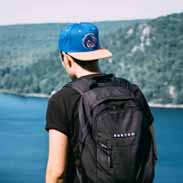Chemistry – Liquids
Unlock all answers in this set
Unlock answersquestion
Which of these observations are not explained by kinetic-molecular theory? --When a gas is heated, it expands. --At very low temperatures, gases expand less for a given pressure change than they do at high temperatures. --If the volume of a gas decreases, its pressure increases at constant temperature. --When gas is added to a rigid container, the pressure inside the container increases
answer
At very low temperatures, gases expand less for a given pressure change than they do at high temperatures.
question
takes the shape of its container:
answer
liquid
question
fills all available space:
answer
gas
question
can be poured:
answer
liquid
question
maintains its shape:
answer
solid
question
is compressible:
answer
gas
question
has a fixed volume:
answer
liquid and solid
question
Viscosity
answer
The thickness or resistance to flow of a liquid
question
Surface tension
answer
The tendency for a liquid surface to resist penetration
question
Surfactant
answer
Can reduce surface tension
question
Dissolve
answer
When a solid, liquid, or gas becomes intergrated into a host liquid
question
Msicible Liquids
answer
Dissolve in each other
question
Immiscible Liquids
answer
Cannot dissolve in each other
question
The forces between water molecules are stronger than the forces between ethanol molecules. Which liquid would probably be most difficult for an insect to walk on? Explain your answer.
answer
Include: --An insect would have an easier time walking on the surface of water than on the surface of ethanol. --Water's stronger intermolecular forces lead to higher surface tension. --Higher surface tension allows water to support the insect.
question
A student places a small amount of water in a glass dish and then carefully places a small paperclip on the surface of the water. The paperclip floats. What happens if the student adds a drop or two of dish soap to the water? Explain your answer.
answer
Include: --Adding soap makes the paperclip fall through the water to the bottom of the dish. --Soap is a surfactant. --Surfactants reduce the surface tension of a liquid. --The surface tension of water is what supported the paper clip.
question
A sample of water is mixed with a surfactant. What will most likely happen to the viscosity of the water? Explain your answer.
answer
Include: --The viscosity of the water will decrease. --Surfactants disrupt intermolecular forces within a liquid. --Viscosity is directly related to intermolecular forces. --If intermolecular forces are decreased, viscosity should also decrease.
question
Describe two uses of surfactants. At least one must be something that was not described in the passage. For each example, explain how the effects of the surfactant make it useful.
answer
Include: --Surfactants are used to help improve gas exchange in the lungs of premature infants. --Surfactants are used to prevent salad dressings from separating. --Pulmonary surfactants reduce the surface tension of the gas exchange surfaces in the lungs, allowing gases to diffuse more easily. --Surfactants help the water molecules and oil molecules in salad dressings interact and mix.
question
What happens when a solid is dissolved into a liquid?
answer
Solid particles become evenly dispersed among liquid particles.
question
Which process most likely takes place when the kinetic energy of molecules overcomes the intermolecular forces?
answer
boiling
question
Which molecules would most likely cause a liquid to have the lowest viscosity?
answer
small, nonpolar molecules
question
Liquids and solids are referred to as \"condensed phases\" because the attractive forces
answer
leave little space between the molecules.
question
Melting can be best described as a process in which molecules
answer
gain enough kinetic energy to get past each other.
question
What happens as a result of the kinetic energy of the particles in a liquid being comparable with the intermolecular attractions between the particles?
answer
The particles move enough that they are not fixed in place, and the liquid can flow.
question
Valerie wants to examine the properties of a thick liquid but is finding it difficult to pour the liquid into a beaker. She needs to finish her investigation before the end of class. Which method will allow her to pour the liquid easily?
answer
applying heat to the liquid
question
Which postulate of the kinetic-molecular theory applies to the particles of a liquid?
answer
They have enough kinetic energy to easily slide by each other.
question
Glycerol boils at a higher temperature than water. What does this indicate about the attractive forces of glycerol?
answer
They are stronger than those in water.
question
Why are liquids well suited for hydraulics?
answer
Liquids are incompressible.



